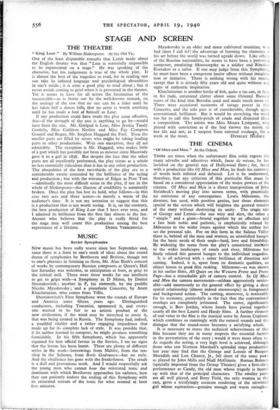MUSIC
Soviet Symphonies NEW music has been sadly scarce since last September and, since there is a limit to one's stock of ideas about the round dozen of symphonies by Beethoven and Brahms, though not to one's pleasure in listening to them, Mr. Alan Bush's concert of works by contemporary Russian composers at Queen's Hall last Saturday was welcome, in anticipation at least, as grist to the critical mill. There were three works for our intellects to get to grips with—a Symphony in D Minor, by Dmitri Shostakovitch ; another in F, his sixteenth, by the prolific Nicolai Myaskovsky ; and a pianoforte Concerto, by Aram Khachaturian, who comes from Tiflis.
Shostakovitch's First Symphony went the rounds of Europe and America some fifteen years ago. Distinguished conductors, including Toscanini, sponsored it, and every- one wanted to be fair to an artistic product of the new civilisation, if the word may be stretched to cover it, that was being created in Russia. The Symphony had, indeed, a youthful vitality and a rather engaging impudence that made up for its complete lack of style. It was possible that, if its author learned to compose, he might produce something formidable. In his fifth Symphony, which has apparently regained for him official favour in the Soviets, I see no signs that the lesson has been learnt. There are plenty of different styles in the work—borrowings from Mahler, from the tea- shop in the Scherzo, from Boris Godounov—but no style. And the ebullience has gone with the freakishness. The result is a dull and pretentious work. And I would respectfully ask the young men who cannot bear the reiterated tonic and dominant with which Beethoven approaches his cadence, how they can patiently endure the ending of this Symphony with its reiterated scream of the tonic for what seemed at least five minutes. Myaskovsky is an older and more cultivated musician, wIlo had (dare I call it?) the advantage of learning the elements of his art before the world was turned upside down. Like others of the Russian nationalists, he seems to have been a part-time composer, emulating Moussorgsky as a soldier and Rimsky- Korsakov as a sailor. If one may judge from this Symphony, he must have been a competent junior officer without imagina- tion or initiative. There is nothing wrong with his music, except that it is already fifty years old and quite without any signs of authentic inspiration.
Khachaturian is another kettle of fish, quite a tin can, in fact, in his rude, untutored clatter about some Oriental Russian tunes of the kind that Borodin used and made much more of. There were occasional moments of savage power in this Concerto, and the solo part is of considerable, though quite conventional, brilliance. But it would be stretching the word too far to call this hotch-potch of crude and disjected ideas a composition. The soloist was Miss Moura Lympany, who played with conviction as if she had known the music all her life and not, as I suspect from external evidence,. for a










































 Previous page
Previous page